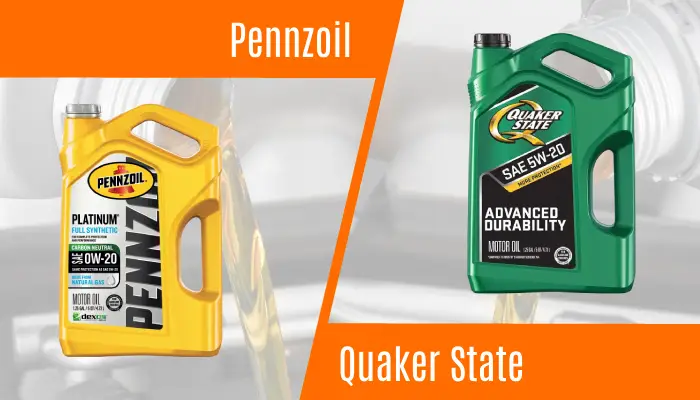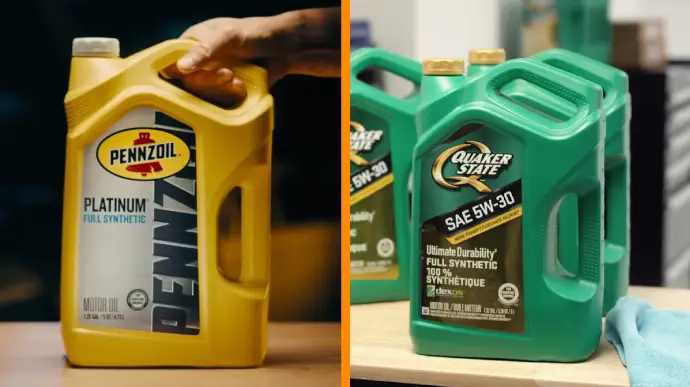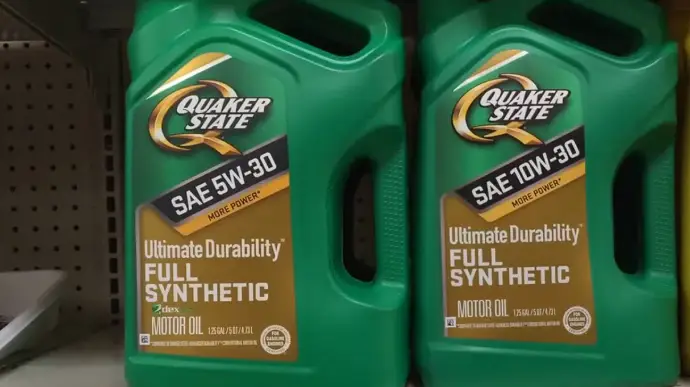Physical Address
304 North Cardinal St.
Dorchester Center, MA 02124
Physical Address
304 North Cardinal St.
Dorchester Center, MA 02124

Your vehicle’s performance and longevity can be significantly impacted by choosing the right motor oil. Two prominent choices in the market, Pennzoil and Quaker State, both come from the same brand, Shell. However, they offer distinct formulations tailored to different engine types and requirements.
Pennzoil utilizes natural gas as its primary base oil source, contributing to engine cleanliness and longevity. It is designed for high-power engines, such as sports cars, catering to gasoline and diesel engines.
In contrast, Quaker State is derived from crude oil and is primarily suitable for gasoline engines with average power, making it a budget-friendly option.
Here, we will explore the differences between Pennzoil and Quaker State motor oil, two popular options for maintaining your vehicle engine’s health. Get ready to dive into the world of motor oil and make informed decisions for your beloved vehicle.
No products found.
No products found.

You should consider several important factors when comparing Pennzoil motor oil with Quaker State motor oil.
Consider their base oil composition to understand the differences between Pennzoil and Quaker State motor oil for vehicles.
Pennzoil motor oil is primarily derived from natural gas, which gives it unique properties that can enhance the longevity of your engine. On the other hand, Quaker State motor oil is made from crude oil and utilizes a blend of synthetic and conventional materials.
Pennzoil’s synthetic oil is formulated to meet the demands of high-power engines, making it an excellent choice for racing or sports cars. It’s designed to provide superior protection and performance, especially in extreme driving conditions.
Pennzoil’s synthetic oil is compatible with gasoline and diesel engines, making it suitable for many high-performance vehicles.
Conversely, Quaker State is primarily recommended for gasoline engines. It’s specifically formulated to meet the needs of vehicles with average power. While Quaker State may not be ideal for high-performance vehicles, it’s reliable for everyday driving.
Pennzoil’s ZDDP (Zinc) additives provide wear protection and promote engine longevity, making it an ideal choice for high-performance sports cars. The presence of Zinc in Pennzoil helps reduce metal-to-metal contact, preventing engine parts from wearing out quickly under high-stress conditions.
Alternatively, Quaker State utilizes a combination of synthetic hydrocarbons, polyalphaolefins, and Zinc additives. While these additives still offer protection against wear, they’re more suited for daily vehicles rather than high-power engines.
Pennzoil claims up to 98% engine efficiency, which can result in better fuel economy performance. It’s specifically designed to maintain engine performance even in extreme weather conditions.
On the other hand, Quaker State boasts up to 99% engine efficiency and is known for improving fuel efficiency. This makes it a strong choice for those looking to economize.
Regular oil changes are critical for keeping your engine running smoothly and efficiently. Pennzoil recommends changing your oil every 10,000 miles (16,000 km), every 12 months, or every 350 hours of engine run time, whichever comes first. This will extend your engine’s life and help keep your fuel consumption low.
However, the Quaker State does not recommend changing your engine oil more frequently than necessary is not necessary for optimal performance. They recommend following the guidelines set by your vehicle’s manufacturer to maintain protection and avoid any potential issues.
However, it’s important to note that these recommendations may vary depending on vehicle make, model, and driving habits. Refer to your vehicle’s owner’s manual for the manufacturer’s specific recommendations for oil change intervals.
Pennzoil focuses on reducing oil consumption and extending the time between oil changes through the use of low-viscosity oil. This means that the oil flows more easily through the engine, reducing friction and heat and the amount of oil burned off.
Conversely, Quaker State takes a different approach by focusing on piston cleaning. By keeping the pistons clean, Quaker State motor oil prevents oil burn-off and ensures that the engine operates at peak efficiency.

With Pennzoil motor oil, deposits and sludge are prevented from forming in your engine. This helps ensure that seals remain free from contaminants that could cause leaks or other seal-related issues.
In addition to its cleaning properties, Pennzoil also provides effective protection for engine seals, helping to extend their lifespan and maintain their integrity.
On the other hand, Quaker State Motor Oil focuses on active seal conditioning agents. These agents work to rejuvenate and condition seals, helping to prevent leaks and improve overall seal performance.
Pennzoil utilizes hyper-cleaning technology to optimize catalytic converter performance. This technology helps to reduce emissions and promote a greener driving experience.
Using Pennzoil motor oil ensures that your catalytic converter is working at its best, effectively converting harmful gasses into less harmful substances.
Then again, Quaker State motor oil enhances catalytic converter performance by using superior zinc additives. These additives provide an alternative method for emission control, helping to maintain the efficiency of your catalytic converter.
To further understand the differences between Pennzoil and Quaker State motor oil for vehicles, it’s also important to consider their respective industry specifications.
Pennzoil’s products exceed industry standards based on ILSAC GF-6 and API SP. The ILSAC GF-6 specification ensures enhanced fuel economy, improved engine protection, and compatibility with modern engine technologies.
API SP certification indicates that Pennzoil motor oil meets the latest requirements for wear protection, deposit control, and oil consumption.
Meanwhile, Quaker State complies with ILSAC GF-6A and API SP/SP-Resource standards. The GF-6A specification is similar to GF-6 but with additional requirements specific to certain engine types. The SP-Resource certification means that Quaker State motor oil contains a minimum level of renewable resources.
Pennzoil, known for its high-quality synthetic oil and specialized additives, tends to be on the higher end of the price spectrum. This is due to its focus on performance and engine protection, which may justify the higher cost for some vehicle owners.
On the other hand, Quaker State is generally considered more budget-friendly, offering a cost-effective option for those looking for reliable engine oil without breaking the bank.
It is still an excellent choice among budget-conscious consumers because Quaker State provides excellent lubrication and protection for your vehicle’s engine.
Mixing Pennzoil and Quaker State motor oil in your vehicle is perfectly safe if you use the recommended weight specified in your vehicle owner’s manual. Pennzoil and Quaker State are reputable motor oil brands offering various viscosity options to suit different engine types and operating conditions.
The weight of motor oil refers to its viscosity or thickness, which affects how well it flows and lubricates your engine. Using the wrong weight of motor oil can lead to poor engine performance, increased wear and tear, and potential damage.
One reason Pennzoil is considered superior is because it offers a higher performance level than other motor oils on the market. This is because Pennzoil Synthetic motor oil uses base oil made from natural gas, which is purer than base oil made from crude oil.
Using natural gas as a base oil allows Pennzoil to deliver enhanced protection for your engine, ensuring optimal performance and longevity. The purer base oil also improves viscosity control, maintaining its optimal thickness even under extreme temperatures.

Quaker State All Mileage oil is a synthetic blend of motor oil that provides durable wear protection for new and old vehicles. It allows you to confidently take on daily commutes and drive under any conditions.
It contains a unique blend of synthetic base oils and additives that reduce friction, prevent engine wear, and keep your engine running smoothly.
Quaker State All Mileage oil also offers excellent protection against sludge and deposits, ensuring that your engine stays clean and performs at its best.
Pennzoil and Quaker State are prominent options with their unique compositions and intended purposes. The differences outlined in this comparison provide essential insights for consumers seeking the ideal motor oil for their vehicles.
While both brands offer quality options, Pennzoil is known for its superior performance and protection, making it a popular choice among car enthusiasts. On the other hand, Quaker State’s all-mileage oil is designed to provide lasting protection for high-mileage vehicles.
Also, understanding the differences in base oil sources, additive components, and performance enhancements helps you make the right choice.
Last update on 2026-03-03 / Affiliate links / Images from Amazon Product Advertising API